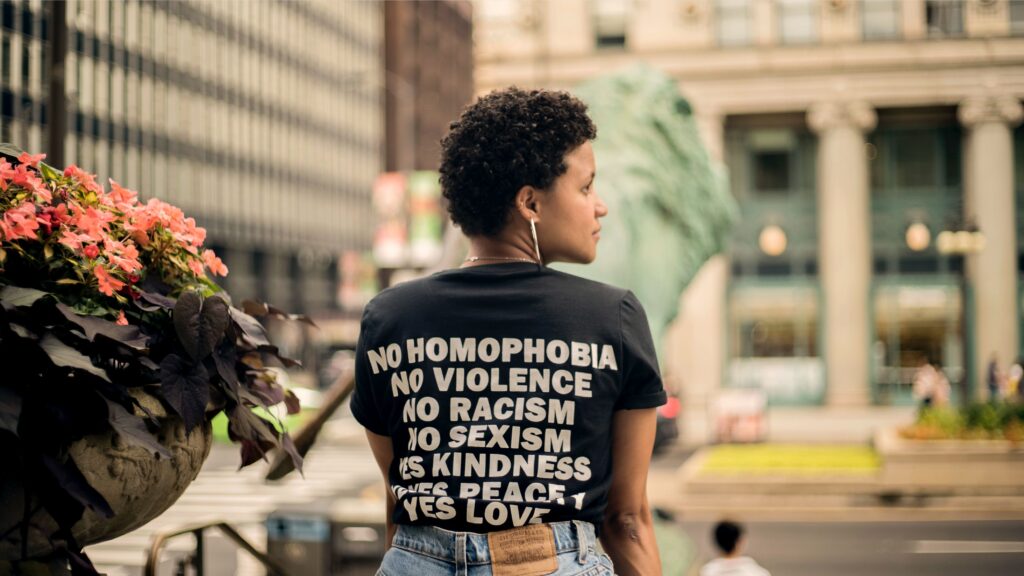Humans evolved from primate species which are rooted in aggressive, dominance hierarchies. Although primates can be very caring towards their infants and, by degrees, their allies, within and between group violence is not uncommon. Baboons and chimpanzees have been known to go to “war”, for example.
With that potential lurking in our evolutionary background, we can see why us humans might be led to do “bad” things. The truth is that, while certain tendencies are inherited – and therefore “natural” – we don’t have one prototype or way of being. We are an enormous mix of potentials, talents, and behaviors. These potentials are heavily contextual. Our environment influences the way our genes are expressed – a process known as epigenetics. Our formatives years in particular play an important role in influencing whether or not we orientate towards a caring and friendly approach to others or a hostile and aggressive one. We are a plastic, contextually sensitive species.
What matters then is whether we live in environments which reinforce our compassion and whether or not we as individuals choose to nurture and cultivate it. Where societies have been based on power, wealth, and hierarchy, conflict and suffering often result. In the last 5000 years we have reaped war, holocaust, and torture upon millions. Empires have been built on slavery and the mistreatment of women, children, and our planet and still today great amounts of money are poured into researching and manufacturing new weaponry designed to cause as much catastrophe as scientifically possible.
This potential for humanity stands in stark contrast to the way we lived as hunter-gatherers. In those societies we developed interdependent and interconnected groups. Hierarchies were largely shunned, and the welfare of the collective was prioritized. The problem we face as a society is identifying how that way of being can be transposed onto much larger populations with much greater resources. But the key thing to remember is that we can make a choice. A difficult one perhaps but a choice all the same. There is nothing inevitable about the way we live now or have done in recent centuries. Farming allowed group sizes to expand and resources to be accumulated. This broke the reciprocal and reputation-based ways of living that had existed for nearly two million years and incited competition and conflict. We don’t have to be held captive by this response however – humans have evolved extraordinary capacities for internal awareness, conscious planning and organization, and thinking that allows us to create societies in the image we want.

As we move forward in time and understand our psychology better, identifying how to create social contexts that support a compassionate mind will be our greatest challenge. There is, however, an inherent danger in the increasing interest in compassion – that we forget it’s true meaning. The Western middle-classes have rather latched on to the idea of compassion as a way of creating happiness or efficient businesses, and while that is laudable (and not untrue) it escapes a major purpose or urgency of compassion. Compassion’s main purpose – as grounded in most spiritualities – is to address the dark-side of humanity, guides us to help us practice how to be helpful (not harmful) and alleviate suffering.
When we look at some of the terrible tragedies of the world today from Ukraine to the subjugation of people through political violence to the neglect of those without power and the gross economic inequalities all around us we see why it is so important to understand how to create compassionate minds, compassionate groups, compassionate organisations, and compassionate societies. It needs training guided by scientific insight. It needs courage and it needs wisdom. Yes, we have the potential to be compassionate under certain conditions and to certain individuals but we have to break-out of our evolved, contextual limitations. That is going to require us to use our intelligence, our wisdom, and our dedication to work together to create a better world. This is what the Global Compassion Coalition stands for – to pool our wisdoms for the most important endeavour of our species. Although it is easy to feel disheartened by the horrors of the world, and the challenges in front of us, it is also worth remembering that we are so much better now than we were 500 years in so many areas of life. The great challenge however is inhibiting the dark side which is carried in the motivation for power and control – if compassion can find a way to offset that, then humanity has a wonderful future.
Prof Paul Gilbert is Founder of the Compassionate Mind Foundation, a clinical psychologist, and a founder and Board member of the Global Compassion Coalition. He is writing in his own capacity.
